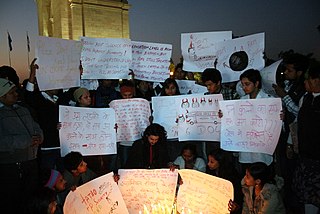The law in Bhutan prohibits the consumption or distribution of pornography. It is defined in Section 476 (A) of the Bhutan Penal Code of 2004, which states, "A defendant shall be guilty of the offence of computer pornography if the defendant publishes and distributes an obscene photography or picture on the computer or over the internet." [1]
Social messaging app WeChat has popularised pornography in Bhutan. [2]
The Royal Bhutan Police registered seventeen cases of computer pornography between 2007 and 2019. [2]
On 13 April 2018, two women were convicted for pornography for taking nude photographs of their friend while asleep from being drunk and posting them on WeChat. On 14 May, the court sentenced the girl who took the picture and posted it on WeChat. She was detained for 14 days after her arrest and had to pay 43,250 ngultrum in lieu of her original serving period of nearly a year. The other girl who told her to take the photo was sentenced to six months in prison, but was also detained for 14 days so she paid 20,750 ngultrum instead. [1]

The Controlling the Assault of Non-Solicited Pornography And Marketing (CAN-SPAM) Act of 2003 is a law passed in 2003 establishing the United States' first national standards for the sending of commercial e-mail. The law requires the Federal Trade Commission (FTC) to enforce its provisions. Introduced by Republican Conrad Burns, the act passed both the House and Senate during the 108th United States Congress and was signed into law by President George W. Bush in December 2003 and was enacted on January 1, 2004.

Perverted Justice Foundation, Inc., more commonly known as Perverted-Justice, was an American organization based in California and Oregon which investigated, identified, and publicized the conduct of adults who have used chat rooms and other social media in order to solicit online sexual conversations and in-person meetings with minors. Their website serves as an archive of collected data on these investigations, which they make available in order to assist law enforcement and the public in understanding the behavior and child grooming techniques of online hebephiles.
In 2004, seven men living on Pitcairn Island faced 55 charges relating to sexual offences against children and young adults. The accused represented a third of the island's male population and included Steve Christian, the mayor. On 24 October, all but one of the defendants were found guilty on at least some of the charges. Another six men living abroad, including Shawn Christian, who later served as mayor of Pitcairn, were tried on 41 charges in a separate trial in Auckland, New Zealand, in 2005.
Sexual grooming is the action or behavior used to establish an emotional connection with a vulnerable person – generally a minor under the age of consent – and sometimes the victim's family, to lower their inhibitions with the objective of sexual abuse. It can occur in various settings, including online, in person, and through other means of communication. Children who are groomed may experience mental health issues, including "anxiety, depression, post-traumatic stress, and suicidal thoughts."
Sharon Rina Lopatka was an Internet entrepreneur in Hampstead, Maryland, United States who was killed in a case of apparent consensual homicide. Lopatka was tortured and strangled to death on October 16, 1996, by Robert "Bobby" Frederick Glass, a computer analyst from North Carolina. The apparent purpose was mutual sexual gratification.
William LaFortune is an American politician who served as the 37th Mayor of Tulsa, Oklahoma from 2002 to 2006 and is currently a district judge in Tulsa County.

A webcam model is a video performer who streams on the Internet with a live webcam broadcast. A webcam model often performs erotic acts online, such as stripping, masturbation, or sex acts in exchange for money, goods, or attention. They may also sell videos of their performances. Once viewed as a small niche in the world of adult entertainment, camming became "the engine of the porn industry," according to Alec Helmy, the publisher of XBIZ, a sex-trade industry journal.
United States v. Williams, 553 U.S. 285 (2008), was a decision by the Supreme Court of the United States that a federal statute prohibiting the "pandering" of child pornography did not violate the First Amendment to the United States Constitution, even if a person charged under the code did in fact not possess child pornography with which to trade.
Legal frameworks around fictional pornography depicting minors vary depending on country and nature of the material involved. Laws against production, distribution, and consumption of child pornography generally separate images into three categories: real, pseudo, and virtual. Pseudo-photographic child pornography is produced by digitally manipulating non-sexual images of real minors to make pornographic material. Virtual child pornography depicts purely fictional characters. "Fictional pornography depicting minors," as covered in this article, includes these latter two categories, whose legalities vary by jurisdiction, and often differ with each other and with the legality of real child pornography.

To Catch a Predator is an American reality television series in the television news magazine program Dateline NBC featuring confrontations of host Chris Hansen, partly filmed with a hidden camera, with adult men arriving at a sting house to have sex with a minor and typically being arrested as a result. The minors are adults impersonating underage persons in online chats.
Internet homicide, also called internet assassination, refers to killing in which victim and perpetrator met online, in some cases having known each other previously only through the Internet. Also Internet killer is an appellation found in media reports for a person who broadcasts the crime of murder online or who murders a victim met through the Internet. Depending on the venue used, other terms used in the media are Internet chat room killer, Craigslist killer, Facebook serial killer. Internet homicide can also be part of an Internet suicide pact or consensual homicide. Some commentators believe that reports on these homicides have overemphasized their connection to the Internet.

In the United States, child pornography is illegal under federal law and in all states and is punishable by up to life imprisonment and fines of up to $250,000. U.S. laws regarding child pornography are virtually always enforced and amongst the sternest in the world. The Supreme Court of the United States has found child pornography to be outside the protections of the First Amendment to the United States Constitution. Federal sentencing guidelines on child pornography differentiate between production, distribution, and purchasing/receiving, and also include variations in severity based on the age of the child involved in the materials, with significant increases in penalties when the offense involves a prepubescent child or a child under the age of 18. U.S. law distinguishes between pornographic images of an actual minor, realistic images that are not of an actual minor, and non-realistic images such as drawings. The latter two categories are legally protected unless found to be obscene, whereas the first does not require a finding of obscenity.

Amanda Michelle Todd was a 15-year-old Canadian student and victim of cyberbullying who hanged herself at her home in Port Coquitlam, British Columbia. A month before her death, Todd posted a video on YouTube in which she used a series of flashcards to tell her experience of being blackmailed into exposing her breasts via webcam on the livestreaming and online chat service Blogger, and of being bullied and physically assaulted. The video went viral after her death, resulting in international media attention. The original video has had more than 15 million views as of May 2023, although mirrored copies of the video had received tens of millions of additional views shortly after her death; additionally, a YouTube video by React has a video of teens reacting to Todd's video which has garnered 44.7 million views as of May 2023, and various videos from news agencies around the world regarding the case have registered countless millions more. The Royal Canadian Mounted Police and British Columbia Coroners Service launched investigations into the suicide.

The 2012 Delhi gang rape and murder, commonly known as the Nirbhaya case, involved a rape and fatal assault that occurred on 16 December 2012 in Munirka, a neighbourhood in South Delhi. The incident took place when Jyoti Singh, a 22-year-old physiotherapy intern, was beaten, gang-raped, and tortured in a private bus in which she was travelling with her male friend, Avnindra Pratap Pandey. There were six others in the bus, including the driver, all of whom raped the woman and beat her friend. She was rushed to Safdarjung Hospital in Delhi for treatment and, as the public outrage mounted, the government had her transferred to Mount Elizabeth Hospital, Singapore eleven days after the assault, where she succumbed to her injuries two days later. The incident generated widespread national and international coverage and was widely condemned, both in India and abroad. Subsequently, public protests against the state and central governments for failing to provide adequate security for women took place in New Delhi, where thousands of protesters clashed with security forces. Similar protests took place in major cities throughout the country. Since Indian law does not allow the press to publish a rape victim's name, the victim was widely known as Nirbhaya, meaning "fearless", and her struggle and death became a symbol of women's resistance to rape around the world.

Audrie Taylor Pott was a 15-year-old student at Saratoga High School in Saratoga, California, who died by suicide. She had been sexually assaulted at a party eight days earlier by three 16-year-old boys she knew, and nude pictures of her were posted online with accompanying bullying.
The Bathtub Girls murder took place in Mississauga, Ontario, Canada, on January 18, 2003. Two sisters, whose identities along with the victims are protected under Canada's Youth Criminal Justice Act (YCJA) as they were minors at the time of the crime, conspired to murder their alcoholic, neglectful mother and make it appear as if she had accidentally drowned while taking a bath, in order to claim the insurance money. The death was not considered suspicious for almost a year.

Alicia Kozakiewicz, also known as Alicia Kozak, is an American television personality, motivational speaker, and Internet safety and missing persons advocate. Kozakiewicz is the founder of the Alicia Project, an advocacy group designed to raise awareness about online predators, abduction, and child sexual exploitation. She is also the namesake of "Alicia's Law", which provides a dedicated revenue source for child rescue efforts. Kozakiewicz has worked with television network Investigation Discovery (ID) to educate the public on, and effect change for, issues such as Internet safety, missing people, human trafficking, and child safety awareness education.

Jessica Lynn Heeringa was a 25-year-old woman from Norton Shores, Michigan, who disappeared from the Exxon gas station where she was working on the night of April 26, 2013.

Joshua Adam Schulte is a former Central Intelligence Agency (CIA) employee who was convicted of leaking classified documents to WikiLeaks. WikiLeaks published the documents as Vault 7, which The New York Times called "the largest loss of classified documents in the agency's history and a huge embarrassment for C.I.A. officials." After his conviction, the Department of Justice called it "one of the most brazen and damaging acts of espionage in American history."
GirlsDoPorn was an American pornographic website active from 2009 until 2020. In October and November 2019, six people involved with the website were charged on counts of sex trafficking by force, fraud, and coercion. In December 2019, two more individuals were charged with obstruction of sex trafficking enforcement. The website was removed in January 2020 after 22 victims won the civil case against the company. According to the United States Department of Justice, the website and its sister website GirlsDoToys generated over $17 million in revenue. Videos were featured on GirlsDoPorn.com as well as pornography aggregate websites such as Pornhub, where the channel reached the top 20 most viewed, with approximately 680 million views.